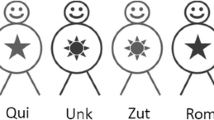Abstract
The current study evaluated whether college students’ performance on visual–visual matching-to-sample (MTS) tasks were differentially affected by learning to verbally relate the names of visual stimuli. During Experiment 1, eight college students learned to tact arbitrary stimuli, followed by intraverbal training that either related the names of these stimuli (e.g., A1B1C1; class-consistent), or related irrelevant names. Participants were subsequently exposed to baseline training, and equivalence tests. During Experiment 2, eight participants received intraverbal training that included names that were either consistent or inconsistent with the to-be-trained visual stimulus classes. During Experiment 3, eight participants received consistent and inconsistent intraverbal training prior to tact training. In all experiments, class-consistent intraverbal training yielded fewer trials to criterion, and fewer errors during MTS baseline training. Class inconsistent intraverbal training led to most errors during MTS training with corresponding low yields in equivalence tests, whereas the tact and intraverbal training sequence did not seem to differentially affect training and testing performances. These results suggest that participants’ history of verbally relating stimuli together influences outcomes on MTS training and performance on tests for emergent relations.







Similar content being viewed by others
References
Arntzen, E. (2006). Delayed matching to sample and stimulus equivalence: Probability of responding in accord with equivalence as a function of different delays. The Psychological Record, 56(1), 135–167. https://doi.org/10.1007/BF03395541
Arntzen, E., & Mensah, J. (2020). On the effectiveness of including meaningful pictures in the formation of equivalence classes. Journal of the Experimental Analysis of Behavior, 113(2), 305–321. https://doi.org/10.1002/jeab.579
Arntzen, E., Nartey, R. K., & Fields, L. (2018). Reorganization of equivalence classes: Effects of preliminary training and meaningful stimuli. Journal of the Experimental Analysis of Behavior, 109(3), 564–586 http://dx.doi.org.proxy.cc.uic.edu/10.1002/jeab.329
Bentall, R. P., Dickins, D. W., & Fox, S. R. A. (1993). Naming and equivalence: Response latencies for emergent relations. Quarterly Journal of Experimental Psychology, 46(2b), 187–214. https://doi.org/10.1080/14640749308401085
Bentall, R. P., Jones, R. M., & Dickins, D. W. (1999). Errors and response latencies as a function of nodal distance in 5-member equivalence classes. The Psychological Record, 49(1) https://opensiuc.lib.siu.edu/tpr/vol49/iss1/7
Bentall, R. P., & Lowe, C. F. (1987). The role of verbal behavior in human learning III. Instructional effects in children. Journal of the Experimental Analysis of Behavior, 47(2), 177–190. https://doi.org/10.1901/jeab.1987.47-177
Carr, D., & Blackman, D. E. (2001). Relations among equivalence, naming, and conflicting baseline control. Journal of the Experimental Analysis of Behavior, 75(1), 55–76. https://doi.org/10.1901/jeab.2001.75-55
Catania, C. A. (2013). Learning (5th ed.). Sloan.
Catania, C. A., Matthews, B. A., & Shimoff, E. (1982). Instructed versus shaped human verbal behavior: Interactions with nonverbal responding. Journal of the Experimental Analysis of Behavior, 38(3), 233–248. https://doi.org/10.1901/jeab.1982.38-233
Cordeiro, M. C., Zhirnova, T., & Miguel, C. F. (2021). Establishing equivalence-equivalence analogical relations via tact and listener training. Journal of the Experimental Analysis of Behavior, 115, 340–360. https://doi.org/10.1002/jeab.652
Cumming, W. W., & Berryman, R. (1965). The complex discriminated operant: studies of matching-to-sample and related problems. In D. I. Mostofsky (Ed.), Stimulus generalization (pp. 284–330). Stanford University Press.
Diaz, J. E., Luoma, S. M., & Miguel, C. F. (2020). The role of verbal behavior in the establishment of comparative relations. Journal of Experimental Analysis of Behavior, 113(2), 322–339. https://doi.org/10.1002/jeab.582
Dickins, D. W., Bentall, R. P., & Smith, A. B. (1993). The role of individual stimulus names in the emergence of equivalence relations: The effects of interpolated paired-associates training of discordant associations between names. Psychological Record, 43(4), 713–724. https://doi.org/10.1007/BF03395908
Dougher, M., Perkins, D. R., Greenway, D., Koons, A., & Chiasson, C. (2002). Contextual control of equivalence-based transformation of functions. Journal of the Experimental Analysis of Behavior, 72(2), 63–93. https://doi.org/10.1901/jeab.2002.78-63
Elias, N. C., Goyos, C., Saunders, M., & Saunders, R. (2008). Teaching manual signs to adults with mental retardation using matching-to-sample procedures and stimulus equivalence. Analysis of Verbal Behavior, 24(1), 1–13. https://doi.org/10.1007/BF03393053
Fields, L., Hobbie-Reeve, S. A., Adams, B. J., & Reeve, K. F. (1999). Effects of training directionality and class size on equivalence class formation by adults. The Psychological Record, 49(4), 703–723. https://doi.org/10.1007/BF03395336
Fienup, D. M., Mylan, S. E., Brodsky, J., & Pytte, C. (2016). From the laboratory to the classroom: The effects of equivalence-based instruction on neuroanatomy competencies. Journal of Behavioral Education, 25(2), 143–165. https://doi.org/10.1007/s10864-015-9241-0
Gatch, M. B., & Osborne, J. G. (1989). Transfer of contextual stimulus functions via equivalence class development. Journal of the Experimental Analysis of Behavior, 51(3), 369–378. https://doi.org/10.1901/jeab.1989.51-369
Harlow, H. F. (1949). The formation of learning sets. Psychological Review, 56(1), 51–65. https://doi.org/10.1037/h0062474
Hayes, S. C., Fox, E., Gifford, E. V., Wilson, K. G., Barnes-Holmes, D., & Healy, O. (2001). Derived relational responding as learned behavior. In S. C. Hayes, D. Barnes-Holmes, & B. Roche (Eds.), Relational frame theory: A post-Skinnerian account of human language and cognition (pp. 21–49). Kluwer Academic/Plenum.
Hayes, S. C., White, D., & Bisset, R. T. (1988). Protocol analysis and the “silent dog” method of analyzing the impact of self-generated rules. Analysis of Verbal Behavior, 15, 57–63.
Horne, P. J., & Lowe, C. F. (1996). On the origins of naming and other symbolic behavior. Journal of the Experimental Analysis of Behavior, 65(1), 185–241. https://doi.org/10.1901/jeab.1996.65-185
Howland, T. G., Zhelezolgo, K. N., Hanson, R. J., Miguel, C. F., & Lantaya, C. A. (2021). The establishment of visual equivalence classes with a go/no-go successive matching-to-sample procedure. The Psychological Record, 71, 157–166.
Jennings, A. M., & Miguel, C. F. (2017). Teaching intraverbal bidirectional naming to establish generalized equivalence class performances. Journal of the Experimental Analysis of Behavior, 108(2), 269–289. https://doi.org/10.1002/jeab.277
Ma, M., Miguel, C. F., & Jennings, A. (2016). Training intraverbal naming to establish equivalence class performances. Journal of the Experimental Analysis of Behavior, 105(3), 409–426. https://doi.org/10.1002/jeab.203
Mandell, C., & Sheen, V. (1994). Equivalence class formation as a function of the pronounceability of the sample stimulus. Behavioral Processes, 32(1), 29–46. https://doi.org/10.1016/0376-6357(94)90026-6
Meyer, C. S., Cordeiro, M. C., & Miguel, C. F. (2019). The effects of listener training on the development of analogical reasoning. Journal of the Experimental Analysis of Behavior, 112(2), 144–166. https://doi.org/10.1002/jeab.549
Miguel, C. F. (2016). Common and intraverbal bidirectional naming. Analysis of Verbal Behavior, 32(2), 125–138. https://doi.org/10.1007/s40616-016-0066-2
Miguel, C. F. (2018). Problem-solving, bidirectional naming, and the development of verbal repertoires. Behavior Analysis: Research & Practice, 18(4), 340–353. https://doi.org/10.1037/bar0000110
Miguel, C. F., Frampton, S. E., Lantaya, C. A., LaFrance, D. L., Quah, K., Meyer, C. S., Elias, N. C., & Fernand, J. K. (2015). The effects of tact training on the development of analogical reasoning. Journal of the Experimental Analysis of Behavior, 104(2), 96–118. https://doi.org/10.1002/jeab.167
Petursdottir, A. I., Ólafsdóttir, A. R., & Aradóttir, B. (2008). The effects of tact and listener training on the emergence of bidirectional intraverbal relations. Journal of Applied Behavior Analysis, 41(3), 411–415. https://doi.org/10.1901/jaba.2008.41-411
Petursdottir, A. I., Cox, R. E., McKeon, A. C., & Mellor, J. R. (2019). Baseline training sequence affects speed of emergent conditional discriminations. Journal of the Experimental Analysis of Behavior, 112(1), 60–73. https://doi.org/10.1002/jeab.539
Pilgrim, C., Chambers, L., & Galizio, M. (1995). Reversal of baseline relations and stimulus equivalence: II. Children. Journal of the Experimental Analysis of Behavior, 63(3), 239–254. https://doi.org/10.1901/jeab.1995.63-239
Pilgrim, C., & Galizio, M. (1990). Relations between baseline contingencies and equivalence probe performances. Journal of the Experimental Analysis of Behavior, 54(3), 213–224. https://doi.org/10.1901/jeab.1990.54-213
Pilgrim, C., & Galizio, M. (1995). Reversal of baseline relations and stimulus equivalence: I. Adults. Journal of the Experimental Analysis of Behavior, 63(3), 225–238. https://doi.org/10.1901/jeab.1995.63-225
Randell, T., & Remington, B. (1999). Equivalence relations between visual stimuli: The functional role of naming. Journal of the Experimental Analysis of Behavior, 71(3), 395–415. https://doi.org/10.1901/jeab.1999.71-395
Randell, T., & Remington, B. (2006). Equivalence relations, contextual control, and naming. Journal of the Experimental Analysis of Behavior, 86(3), 337–354. https://doi.org/10.1901/jeab.2006.82-05
Santos, P. M., Ma, M. L., & Miguel, C. F. (2015). Training intraverbal naming to establish matching-to-sample performances. Analysis of Verbal Behavior, 31(2), 162–182. https://doi.org/10.1007/s40616-015-0040-4
Saunders, R. R., & Green, G. (1999). A discrimination analysis of training-structure effects on stimulus equivalence outcomes. Journal of the Experimental Analysis of Behavior, 71(1), 117–137. https://doi.org/10.1901/jeab.1999.72-117
Sidman, M. (1971). Reading and auditory-visual equivalences. Journal of Speech & Hearing Research, 14(1), 5–13. https://doi.org/10.1044/jshr.1401.05
Sidman, M. (1986). Functional analysis of emergent verbal classes. In T. Thompson & M. D. Zeller (Eds.), Analysis and integration of behavioral units (pp. 213–245). Lawrence Erlbaum Associates.
Sidman, M. (1994). Equivalence relations and behavior: A research story. Authors Cooperative.
Sidman, M. (2000). Equivalence relations and the reinforcement contingency. Journal of Experimental Analysis of Behavior, 74(1), 127–246. https://doi.org/10.1901/jeab.2000.74-127
Sidman, M., Rauzin, R., Lazar, R., Cunningham, S., Tailby, W., & Carrigan, P. (1982). A search for symmetry in the conditional discriminations of rhesus monkeys, baboons, and children. Journal of the Experimental Analysis of Behavior, 37(1), 23–44. https://doi.org/10.1901/jeab.1982.37-23
Sidman, M., & Tailby, W. (1982). Conditional discrimination vs. matching to sample: An expansion of the testing paradigm. Journal of the Experimental Analysis of Behavior, 37(1), 5–22. https://doi.org/10.1901/jeab.1982.37-5
Skinner, B. F. (1957). Verbal behavior. NY: Appleton-Century-Crofts
Watson, P. J., & Workman, E. A. (1981). The non-concurrent multiple baseline across-individuals design: An extension of the traditional multiple baseline design. Journal of Behavior Therapy & Experimental Psychiatry, 12(3), 257–259. https://doi.org/10.1016/0005-7916(81)90055-0
Data Availability
All data reported in this study are stored in the Verbal Behavior Research Laboratory at California State University, Sacramento. These data are available upon request from the contacting author.
Author information
Authors and Affiliations
Corresponding author
Ethics declarations
Compliance with Ethical Standards
The authors of the current study report no conflict of interest. All participants signed an informed consent describing the procedures as approved by California State University-Sacramento’s Institutional Review Board.
Additional information
Publisher’s Note
Springer Nature remains neutral with regard to jurisdictional claims in published maps and institutional affiliations.
This study is based on a thesis submitted by the first author under the supervision of the fourth author to the Department of Psychology at California State University, Sacramento in partial fulfillment of the requirements for an M.A. degree in Psychology: Applied Behavior Analysis. We thank Erik Godinez, Jillian Sordello, and Sarah Kong for their assistance with data collection, as well as Paula Braga-Kenyon, Megan Heinicke, and Dave Palmer for their feedback.
Rights and permissions
About this article
Cite this article
Chastain, A.N., Luoma, S.M., Love, S.E. et al. The Role of Irrelevant, Class-Consistent, and Class-Inconsistent Intraverbal Training on the Establishment of Equivalence Classes. Psychol Rec 72, 383–405 (2022). https://doi.org/10.1007/s40732-021-00492-9
Accepted:
Published:
Issue Date:
DOI: https://doi.org/10.1007/s40732-021-00492-9




